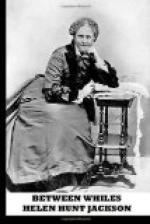It was a sore trial to Jeanne that she had no children,—a sore trial also to her wicked old father, who had plotted that the great Blaycke estates should go down in the hands of his descendants. Not so Willan Blaycke. It was undoubtedly a consolation to him in his last days to think that his son Willan would succeed to everything, and the Dubois blood remain still in its own muddy channel. It is evident that before he died he had come to think coldly of his wife; for his mention of her in his will was of the curtest, and his provision for her during her lifetime, though amply sufficient for her real needs, not at all in keeping with the style in which she had dwelt with him.
The exiled Willan had returned to America a year before his father’s death. He was a quiet, well-educated, rather scholarly young man. It would be foolish to deny that his filial sentiment had grown cool during the long years of his absence, and that it received some violent shocks on his return to his father’s house. But he was full of ambition, and soon saw the opening which lay before him for distinction and wealth as the ultimate owner of the Blaycke estates. To this end he bent all his energies. He had had in England a good legal education; he was a clear thinker and a ready speaker, and speedily made himself so well known and well thought of, that when his father died there were many who said it was well the old man had been taken away in time to leave the young Willan a property worthy of his talents and industry.
Willan had lived in his father’s house more as a guest than as a son. To the woman who was his father’s wife, and sat at the head of his father’s table, he bore himself with a distant courtesy, which was far more irritating to her coarse nature than open antagonism would have been. But Jeanne Dubois was clever woman enough to comprehend her own inferiority to both father and son, and to avoid collisions with either. She had won what she had played for, and on the whole she had not been disappointed. As she had never loved her husband, she cared little that he did not love her; and as for the upstart of a boy with his fine airs, well, she would bide her time for that, Jeanne thought,—for it had never crossed Jeanne’s mind that when her husband died she would not be still the mistress of the fine stone house and the gilt panelled coach, and have more money than she knew what to do with. Many malicious reveries she had indulged in as to how, when that time came, she would “send the fellow packing,” “he shouldn’t stay in her house a day.” So, when it came to pass that the cards were turned, and it was Willan who said to her, on the morning after his father’s funeral, “What are your plans, Madame?” Jeanne was for a few seconds literally dumb with anger and astonishment.
Then she poured out all the pent-up hatred of her vulgar soul. It was a horrible scene. Willan conducted himself throughout the interview with perfect calmness; the same impassable distance which had always been so exasperating to Jeanne was doubly so now. He treated her as if she were merely some dependant of the house, for whom he, as the executor of the will, was about to provide according to instructions.




